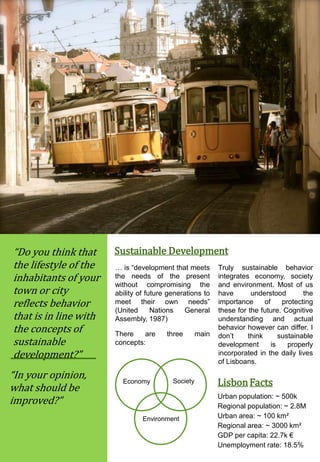
Lisboans' Lifestyle and Sustainable Development
- 1. … is “development that meets the needs of the present without compromising the ability of future generations to meet their own needs” (United Nations General Assembly, 1987) There are three main concepts: Truly sustainable behavior integrates economy, society and environment. Most of us have understood the importance of protecting these for the future. Cognitive understanding and actual behavior however can differ. I don’t think sustainable development is properly incorporated in the daily lives of Lisboans. Sustainable Development SocietyEconomy Environment “Do you think that the lifestyle of the inhabitants of your town or city reflects behavior that is in line with the concepts of sustainable development?” “In your opinion, what should be improved?” LisbonFacts Urban population: ~ 500k Regional population: ~ 2.8M Urban area: ~ 100 km² Regional area: ~ 3000 km² GDP per capita: 22.7k € Unemployment rate: 18.5%
- 2. The table shows examples of behavior to be improved and suggestions for alternative behavior: Lisboans love using cars, the use of public transport decreased in the last years despite the developed network and the lack of parking space for cars. They should take advantage of the good weather and the new bicycle lanes or the public transport. Using a bicycle yields further benefits ( exercise, gasoline savings). Reduction and separation of waste are not important matters for Lisboans. For grocery shopping for example, lots of plastic bags are purchased and used only once. Following the rules for waste separation by the municipality allows recycling. Bringing reusable bags to the supermarket supports the environment and the wallet. What would Portugal be without its famous „Bacalhau“? Unfortunately, codfish is an endangered species. Despite the tradition of eating codfish, Lisboans should opt for not endangered species or fish from aquacultures. Lisboans love fashion, especially when it is cheap. Many people buy clothes in stores with socially questionable reputation. Shopping socially responsible is not an easy matter. Second-hand-stores or local boutiques can surprise with cheap and unique pieces. Gender equality is a concept that the Lisboans have heard of but do not always consider necessary. Wages and even entrance fees for nightclubs can differ. Everyone can contribute to gender equality by respecting and treating men and women the same. Especially employers should try to eliminate any bias. Following the economic recession, Lisboans felt an impact on their lives and had to cut expenses. The country is recovering and people want the municipality to invest heavily and also enjoy life by spending a lot. Even though the prospects look promising, Lisboans should spend carefully, enough to support the economy for growth but avoiding debts that they might struggle to pay back.
- 3. Besides the actions already suggested, Lisboans could go a step further and orientate themselves on the UN Sustainable Development Goals. They could, for example, donate money, donate or distribute food, do volunteer work, tutor kids in their free time, raise awareness for gender issues (including LGBT issues), support sustainable politics and so on. All of this could be considered on municipality level, regional level or global level – helping to shape an integrated world for the future. Conclusion We Lisboans apply the concepts of sustainable development more than many citizens in other parts of the world. However, according to my personal standards there is still a long way to go. Small changes in the daily life could make a big impact overall. “Sustainable development requires human ingenuity. People are the most important resource.” - Dan Shechtman
